Review: Atlas Shrugged
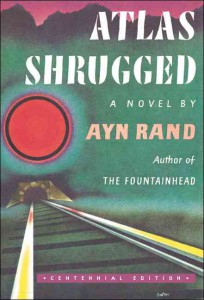 You don’t often get to read a book that’s a philosophical-economic-apocalyptic-thriller. Ayn Rand’s Atlas Shrugged is that, and more. It is also 1950’s capitalist propaganda, but of a reasonably intelligent sort.
You don’t often get to read a book that’s a philosophical-economic-apocalyptic-thriller. Ayn Rand’s Atlas Shrugged is that, and more. It is also 1950’s capitalist propaganda, but of a reasonably intelligent sort.
The story begins in ordinary post-war America. Dagny Taggart, a railroad heiress and a true industrialist (and therefore the heroine of the book), is going about her job as Operations Manager of “Taggart Transcontinental”. Frustrated in her attempts to tap new markets and improve infrastructure she runs into some boardroom intrigue and some political power-plays. She eventually succeeds at refurbishing a branch-line with a new metal developed by another industrialist (and therefore another hero), Hank Rearden. At this stage I almost gave up on the book as a slightly more coal-dusted version of Madmen: interesting characters, an insight into an era, but not much more than a soap opera.
But the end of the story is reached, everything is different. The heroic industrialists have slowly been squeezed out of power by a socialist-pietist elite. These elite have first undermined, and then nationalised, all the good selfishly-motivated but prosperity-generating industry of the heroes.
In broad brush strokes, this is just another socialism-is-the-end-of-the-world tirade from the reds-under-the-bed ’50s, penned by an angst-ridden author whose father was impoverished by the soviets in the early part of the twentieth century. The unique factor, however, is what Rand does with her heroes:
As the economic apocalyptic horsemen appear the industrialists of America begin to disappear. They lay down their factories and vanish off the face of the earth. “Where have they gone?” is asked time and time again. “Who is John Galt?” is the enigmatic answer, a phrase that has come to mean “Who knows?”
At the same time Dagny Taggart, now in the midst of an utterly rational sexual affair with Rearden, is searching after the inventor of a revolutionary new piece of technology. This inventor is out there, somewhere, a messianic figure of self-made virtue. Of course, she eventually finds him. He has hidden himself away, and with his perfect philosophy and rhetorical flair has convinced the oppressed industrialists to join him. Together, they have gone on “strike” – unwilling to exercise their virtue for the sake of the “looters”, the socialists who would seize by force what they have not earned. This man is none other than John Galt, the man of memetic legend.
Galt is their perfect leader. The heroes, including Taggart and Rearden, swoon before his intellect and Rearden relinquishes his romantic attachment to someone so much higher than he. As Galt’s identity is revealed the socialist overlords also swoon, bending their knee; “We need you, we need you!” they cry, aware of their inability for industry. But he remains solid, immovable, even as they attempt to torture him into submission. The world falls apart, and yet Galt remains, untainted by mere affectation, ready and willing to lead his industrialists back into darkened cities to bring forth light and power and a brave new world, stamped by his creed:
I swear by my life and my love of it, that I will never live for the sake of another man, nor ask another man to live for mine.
In summary, that’s it. That’s the story. A bit tedious at times. Intriguing and attractive characters are marred by unrealistic soliloquies and monologues that drone like lecturers who are unaware of their pretentiousness. Have you ever had a book where you feel an attachment to the characters but are angry at the author for turning them into puppets? That’s this book.
But underneath it all there’s actually a coherent (if naïve) philosophy that’s worth engaging with. It’s Rand’s own philosophy, which she dubbed objectivism. Some notes at the end of the book, helpfully summarise this worldview in Rand’s own words:
My philosophy, in essence, is the concept of man as a heroic being, with his own happiness as the moral purpose of his life, with productive achievement as his noblest activity, and reason as his only absolute”
And the essence of objectivism is presented:
1. Metaphysics: Objective reality
2. Epistemology: Reason
3. Ethics: Self-interest
4. Politics: Capitalism
What Rand has done in this novel is build caricatures: objectivist heroes, anti-objectivist villains, and a couple of people who transition from one side to the other to highlight the contrast. While quite exhaustive in scope, there is very little nuance. She builds straw men, into which anyone from the postmodern or communist to the religious conservative could fit, and burns it to the ground in a world over which she alone has control.
Consider her metaphysics of objective reality. In a three hour rant from Galt, on hijacked airwaves, Rand unleashes her rhetoric. Chief amongst it is the metaphysical assertion “A is A.” In practice, the antithesis is this:
To a savage the world is a place of unintelligible miracles where anything is possible to inanimate matter and nothing is possible to him. His world is not the unknown, but that irrational horror: the unknowable He believes that physical objects are endowed with mysterious volition, moved by causeless, unpredictable whims, while he is a helpless pawn at the mercy of forces beyond his control.
The industrialist can prosper because he embraces causes, and becomes a cause. The “looting” mystic simply wants and refuses to answer questions such as “how?” and “is it possible?” The fear-driven mystic simply asserts and demands the fruit of a realist’s virtue.
Rand’s affirmation of reality is a worthy thing. The errors of Rand’s looters are manifold and there are some connections with the errors and troubles of the contemporary world where the double-speak of self-constructed “progressive” worlds are apparent.
But Rand’s problem is that her world is not just real it is also entirely known. Her realism is mediated through almost-omniscient and almost-omnipotent reason-bearers. Amongst Rand’s Galt-led objectivists there are no disputes, not even debates, about the real world. Everything simply “is,” in an unreal containment of the obvious.
With any assertion of objectivity, there’s always the question “who is the subject?” Rand avoids that problem by avoiding situations in which her heroes must grapple with disunity, difference of opinion, diverging rational arguments, and incomplete evidence. Objective reality is best conceived teleologically – as goal or purpose or direction. Rand’s reality is static, and captured by characters that are therefore eventually, and disappointingly, arrogant.
Each of her other tenets are similarly affected: robust only within her fictional world they avoid the questions of the real one. The serene rational man of Rand’s world is the unfeeling utilitarian of real experience. The ethics of self-interest, while refreshingly honest about how many of our “sacrifices” are actually expressions of what we actually want to do, allows no other boundary than that drawn around the individual; it is noteworthy that Rand only explores sexual and fraternal relationships in this book for I don’t think she could contain maternal or familial relationships. And her capitalism conveniently assumes a common sense of fairness (an unreal innate altruism) and avoids the propensity for exploitation that we see around us.
We are all so quick to caricature the 1950’s with their repressive picket fences. It’s a constructed world that we shy away from. Rand’s constructed world doesn’t have picket fences, but it is still an unreal caricature, useful for drawing on for allusions and similes, but not for constructing a coherent picture of the real world.









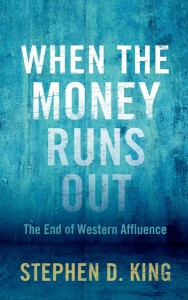
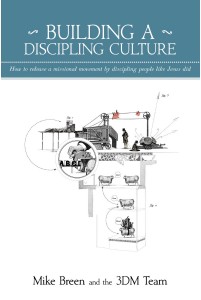
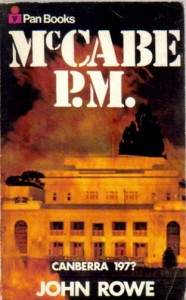
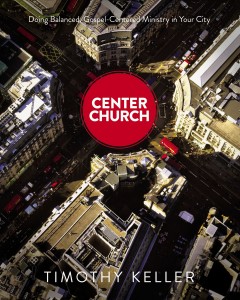

 I first came across Peter’s writings when I first starting blogging in response to the 2008 Lambeth Conference. His voice – emotionally honest, precisely articulated, fundamentally orthodox, post-gay, and of his generation – has been (and I hope will continue to be in some form) an invaluable resource for us all.
I first came across Peter’s writings when I first starting blogging in response to the 2008 Lambeth Conference. His voice – emotionally honest, precisely articulated, fundamentally orthodox, post-gay, and of his generation – has been (and I hope will continue to be in some form) an invaluable resource for us all.